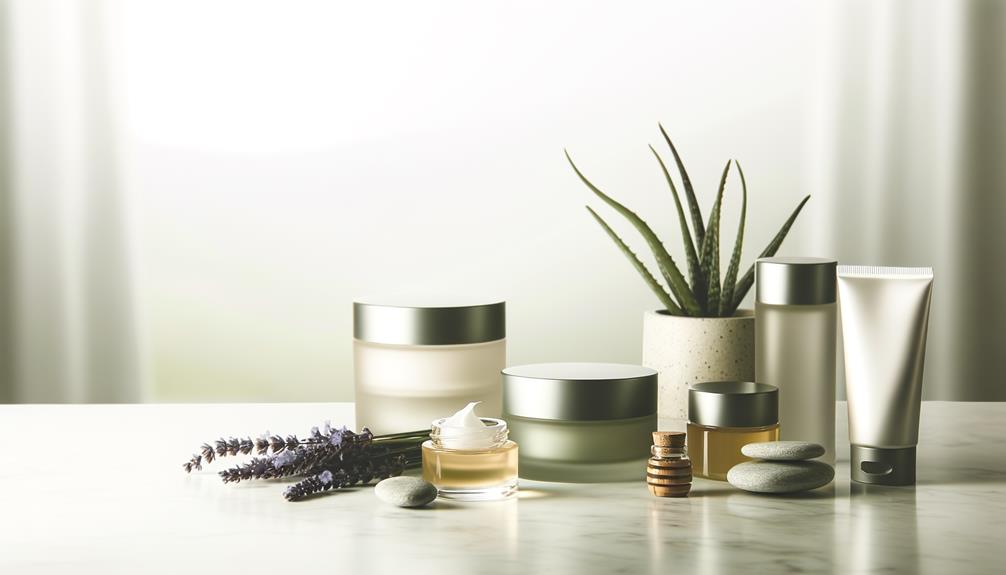When it comes to skincare, isn’t finding the right products like unlocking a treasure trove of radiant skin? You must focus on quality solutions that meet your skin’s unique needs. Start with cleansers that preserve your skin’s natural barrier, and choose moisturizers rich in hydrating ingredients like hyaluronic acid. Serums with powerful actives, such as peptides and antioxidants, can effectively address specific concerns. Pay attention to the importance of exfoliators for skin renewal and sunscreen for UV protection. Let’s explore further to discover how to tailor these products to your skin type.
Cleansers
Choosing the right cleanser is crucial for maintaining your skin’s health and preventing common dermatological issues. You must opt for a product that removes impurities without disrupting your skin’s natural barrier. Gentle formulas are paramount, especially if you have sensitive skin. Harsh cleansers can strip away essential oils, leading to dryness, irritation, and even exacerbation of conditions like eczema or rosacea.
When selecting a cleanser, prioritize those with natural ingredients. These components are less likely to cause adverse reactions and often provide added benefits, such as anti-inflammatory properties. For instance, cleansers containing chamomile or aloe vera can soothe your skin while cleansing it.
Additionally, look for products free of sulfates and parabens, as these chemicals can be harsh and irritating. Evidence suggests that using a balanced pH-based cleanser helps maintain your skin’s acid mantle, a critical aspect of its defense mechanism. Opt for formulations that are pH-balanced to support this protective layer.
Moisturizers
To complement your cleansing routine, a high-quality moisturizer must be used to hydrate and reinforce your skin’s barrier function. Hydrating creams are crucial in maintaining skin hydration by attracting and retaining moisture. Ingredients like hyaluronic acid and glycerin are particularly effective in this regard, as they’re humectants that draw water into the skin.
Anti-aging lotions often contain additional components, such as peptides and antioxidants, which hydrate and combat signs of aging. Peptides can stimulate collagen production, improving skin elasticity and firmness. Antioxidants like vitamins C and E neutralize free radicals, thus preventing oxidative stress and contributing to premature aging.

When selecting a moisturizer, consider your skin type. For oily skin, opt for non-comedogenic, lightweight, hydrating creams that won’t clog pores. Dry skin types benefit from richer formulations containing ceramides and fatty acids to restore the lipid barrier.
Always choose dermatologist-tested products that are free from irritants like parabens and fragrances, especially if you have sensitive skin.
Serums
Serums, concentrated solutions designed to deliver potent active ingredients deep into the skin, can significantly enhance the effectiveness of your skincare routine. These formulations are particularly beneficial because they contain smaller molecules that penetrate the skin more efficiently than creams or lotions.
When choosing an anti-aging serum, look for ingredients like retinol, peptides, and hyaluronic acid. Retinol, a vitamin A derivative, stimulates collagen production and accelerates cell turnover, reducing the appearance of fine lines and wrinkles. Peptides act as building blocks for new proteins like collagen and elastin, essential for maintaining the skin’s firmness and elasticity. Hyaluronic acid, a powerful humectant, attracts and retains moisture, plumping the skin and smoothing wrinkles.
Hydrating serums, on the other hand, focus on delivering an intense moisture boost to the skin. Ingredients like glycerin, niacinamide, and ceramides are key. Glycerin is a well-known humectant that draws water into the skin, while niacinamide (Vitamin B3) improves the skin’s barrier function and boosts hydration. Ceramides, naturally occurring lipids, help restore the skin’s natural barrier, preventing moisture loss and improving overall hydration.
Exfoliators
In addition to serums, exfoliators play a pivotal role in maintaining healthy, radiant skin by removing dead skin cells and promoting cell turnover. Effective exfoliation enhances the absorption of subsequent skincare products, optimizing their efficacy.
Chemical peels and microdermabrasion tools are particularly noteworthy among the various exfoliators available. Chemical peels use alpha hydroxy acids (AHAs) or beta hydroxy acids (BHAs) to dissolve the bonds between dead skin cells. Research indicates that chemical peels can improve skin texture, reduce hyperpigmentation, and stimulate collagen production. When selecting a chemical peel, consider your skin type and specific concerns; for instance, glycolic acid is suitable for dry skin, while salicylic acid targets oily, acne-prone skin.
Microdermabrasion tools, on the other hand, mechanically exfoliate the skin using fine crystals or diamond-tipped wands. Studies have shown that microdermabrasion can enhance skin radiance, decrease pore size, and improve the appearance of fine lines. These tools are beneficial for individuals seeking a non-invasive, at-home solution.
Sunscreens
Sunscreens protect your skin from harmful ultraviolet (UV) radiation, leading to premature aging, sunburn, and an increased risk of skin cancer.
When choosing a sunscreen, it’s crucial to understand the benefits of different formulations. Mineral sunscreens, for example, utilize active ingredients like zinc oxide and titanium dioxide. These compounds sit on the skin’s surface, reflecting UV rays away from your skin. They’re often recommended for individuals with sensitive skin due to their lower risk of irritating.

Moreover, tinted sunscreens serve a dual purpose. They provide UV protection while also offering a cosmetic benefit by evening out skin tone. Tinted sunscreens often contain iron oxides, which offer additional protection against visible light—a spectrum of light that traditional sunscreens mightn’t cover. This makes them particularly beneficial for individuals with hyperpigmentation issues.
When selecting a sunscreen, ensure it offers broad-spectrum protection, meaning it shields against both UVA and UVB rays. Aim for a product with an SPF of at least 30 for daily use. Remember, consistent application and reapplication every two hours, especially when outdoors, is key to maintaining effective protection.
Conclusion
Imagine your skin as a garden. You wouldn’t neglect its unique needs, right?
Just as you’d water plants and protect them from harsh sun, your skin deserves tailored care.
Choose cleansers preserving its natural barrier, moisturizers like hyaluronic acid for hydration, and serums packed with peptides and antioxidants.
Exfoliators ensure renewal, while sunscreen shields from UV damage.
By nurturing your skin with the finest skin care products, you cultivate a thriving, radiant complexion.

